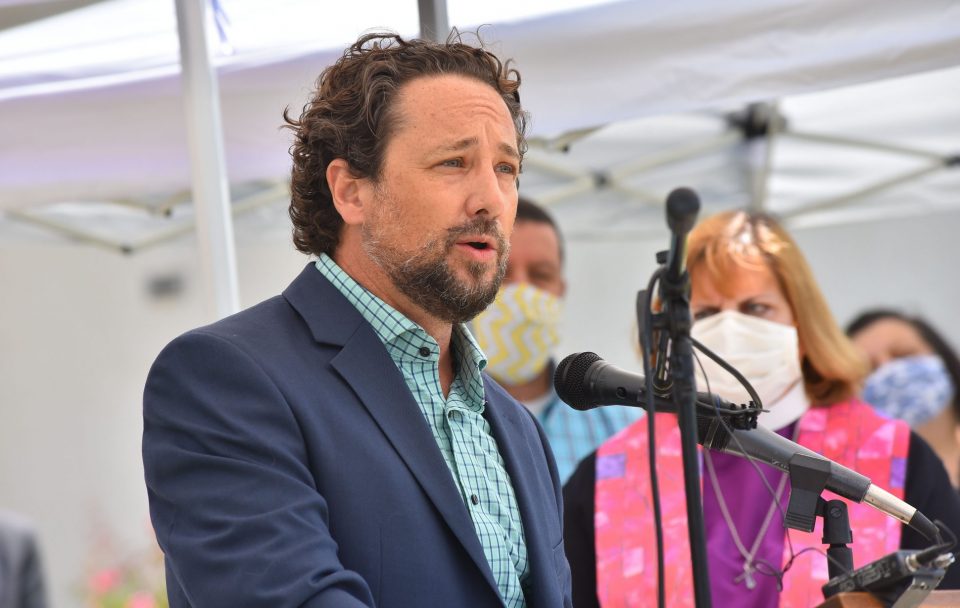REGION — Clergy from a countywide faith coalition, including North County pastors and two regional denominational leaders, called for law enforcement reforms during a June 10 press conference at the Roman Catholic Diocesan Pastoral Center in San Diego.
The group’s appeal came in response to the May 25 killing of George Floyd, an African American male, at the hands of a Minneapolis police officer.
“I’m grateful to have some of my white colleagues stand here with me today, because me and my black colleagues, … we do this every summer,” said the Rev. Terrel Fletcher, a San Diego pastor. “The reality of the matter, white pastor, white bishop, white brethren, [is that] the average racist doesn’t go to my church. The average racist is in your congregation. … I am challenging you as a man or woman of God to call it out. … Our churches subdue problems, instead of expose them and deal with them.”
Fletcher made his petition as a member of the San Diego Organizing Project (SDOP), a nonpartisan group organizing a coalition of 29 congregations countywide, including seven in North County.
Joining Fletcher were more than 20 other SDOP clergy, including Catholics, Mainline and Evangelical Protestants, a Jewish rabbi and a Muslim imam. Among them, Rev. Robert McElroy and Rev. Susan Snook are bishops, or regional overseers, of the Catholic and Episcopal churches, respectively — two of the metropolitan area’s single largest denominations.
“We rupture the compact we have with God through racism and structures of racism,” McElroy said. “[African Americans] have been victimized … through a system of law enforcement, and a justice system and a penal system, which places the black community on the cross.”
Structures of racism also include disparities in healthcare and housing, McElroy said.
“It’s not enough for people of color to do the work [of dismantling systemic racism],” Snook told The Coast News. “[White people] also have to do that work of giving up some of the advantages that we have.”
The SDOP clergy called for four main policing reforms. Some are quite extensive, while others are already underway, but none of the proposed measures have been adopted uniformly across the county’s law enforcement agencies.
LESS POLICING
First, SDOP endorsed H.E.A.T. (Hiring, Equipment, Accountability and Training), an initiative to reduce law enforcement’s footprint in communities.
The group envisions sweeping changes in “how police are hired, the equipment they use, how they are held accountable and the training they are given,” according to a handout from the June 10 press conference.
H.E.A.T. would, according to an informational flyer, “defund and replace most police functions with community-based services. According to the Prison Policy Initiative, only 5 percent of police arrests are for serious violent offenses. It is time for police departments to, at minimum, be cut in half.”
“We’re pretty far behind in … building trust relationships with [police] chiefs across the county,” said Dinora Reyna, SDOP’s executive director, citing that the San Diego City Council recently adopted its budget without reducing police funding.
H.E.A.T. is championed by the Rev. Ben McBride of PICO California, SDOP’s parent organization. McBride didn’t respond to a request for comment.
PROBABLE CAUSE
Second, SDOP wants to “require officers to have probable cause in order to stop, ask for identification, question and/or search an individual,” according to the June 10 handout.
The Supreme Court’s 1968 ruling in Terry v. Ohio and subsequent case law allows police to stop and search someone based on “reasonable suspicion” of criminal activity or that the person is armed. As a matter of law, “reasonable suspicion” is a lower bar than the Fourth Amendment’s “probable cause.”
California case law limits the instances to which reasonable suspicion may apply.
In Escondido, “the vast majority of our stops are based on probable cause,” while reasonable suspicion applies only in “some instances,” Kevin Toth, a departmental spokesman, said in a June 15 email. “All searches are based on probable cause or a warrant.”
But many activists believe the lower bar is generally subject to abuse, as illustrated famously in reaction against New York City’s stop and frisk policy in the 2000s.
Raising the bar to probable cause is part of PrOTECT, a broader agenda of the Coalition for Police Accountability and Transparency, a collaboration between SDOP, ACLU of San Diego and other organizations.
“We want to minimize unnecessary interaction” between the community and police, Jeffrey Karahamuheto, an SDOP organizer, told The Coast News on June 15.
Asked to expound PrOTECT further, SDOP and ACLU of San Diego declined to comment.
CITIZEN OVERSIGHT
Third, SDOP wants to boost a citizen oversight board’s power independently to investigate complaints of law enforcement officer misconduct in the City of San Diego.
Two other such bodies exist in the region: Citizens Law Enforcement Review Board (CLERB), which investigates complaints against San Diego County Sheriff’s deputies, whose jurisdiction covers much of the county, and the Community & Police Relations Commission in National City.
Of the incorporated cities in North County, Encinitas, Solana Beach, Del Mar, Vista and San Marcos contract law enforcement services from the sheriff, and so fall under CLERB’s purview.
Karahamuheto said such boards generally lack teeth to have any meaningful impact. He lauded the Committee of San Diegans for Justice, which proposes beefing up San Diego’s oversight board with subpoena power and its own legal counsel, independent of the city attorney.
Oceanside, Carlsbad and Escondido maintain police forces, but not citizen oversight boards, despite a 2016 grand jury recommendation that they should. At the time, both Oceanside and Escondido City Councils told the grand jury that existing local protocols sufficed for handling complaints.
Oceanside’s current council has “not had a collective discussion on the matter,” Mayor Peter Weiss said in a June 13 email.
WeTheProtesters, Inc. has compiled statewide less-than-lethal use of force data. The nonprofit’s compilation includes a 2019 report from the Oceanside Police Department, which shows that, from 2013 to 2017, the department received 22 complaints about officers’ use of force. Of those complaints, the department’s internal adjudication process found none to be sustained.
Oceanside City Councilwoman Esther Sanchez told The Coast News in a June 16 email that she’s requested information on all complaints against officers the department has received over the past 20 years. She expects the department to respond within the next month or two.
“In light of recent events, … I don’t think any idea is off the table to include citizen oversight,” Escondido Mayor Paul McNamara said in a June 14 email.
DE-ESCALATION
Lastly, the coalition called for “strong de-escalation policies.”
A 2019 San Diego District Attorney review of police-involved shootings found that from 1993 to 2017, 40 percent of cases involved a white officer shooting a non-white subject, while 29 percent involved a white officer shooting a white subject. But the review cautions against drawing conclusions based on a lack of contextual demographic data.
The review found that 78 percent of shootings “did not involve less than lethal force prior to the shooting;” 92 percent involved armed civilian subjects; 79 percent involved subjects under the influence of drugs or alcohol and/or with “mental health issues.”
In 2019, the Sheriff’s Department was the county’s first agency to formalize de-escalation training, which was delivered that year to nearly 1,700 deputies. Compared with numbers from the previous year, 2019 saw reductions of 80 percent and 20 percent in the use of lethal and less-than-lethal force, respectively.
The Sheriff’s Department has also stopped using hand-me-down military weapons and vehicles.
The Carlsbad Police Department recently adopted the “8 Can’t Wait” agenda, including eight policy categories aimed at restricting police use of force.
Police in Oceanside and Escondido already implement some manner of de-escalation training, departmental spokesmen said.
The 2019 district attorney review found that traffic-related incidents are among the most likely preludes to officer-involved shootings. Similarly, of 12 possible types of police-civilian contact preceding an officer’s use of force, “vehicle/bike/pedestrian stop” was the third most common, according to The Coast News’ analysis of the state’s URSUS Use of Force Database.
Analysis by the state government indicates racial disparities in statewide law enforcement stops.
“Officers searched Hispanic, Black, Native American, and Multiracial individuals at a higher rate than they searched White individuals, despite discovering contraband on members of these groups less frequently when searched,” according to a 2020 report on stop data from a state attorney general’s advisory board. Certain statewide agencies, including the San Diego County Sheriff and San Diego Police Department, collected the stop data in 2018, as required by the state’s Racial and Identity Profiling Act (RIPA).
A May 26 San Diego County Sheriff’s report on 2019 stop data specifically within its jurisdiction corroborates this disparity. The proportion of deputies’ searches yielding contraband or evidence varied by up to six percentage points, depending on race: Asians came up clean most frequently (82 percent), whites and Native Americans least frequently (76 percent).
Investigating current racial patterns in local agencies’ use of force is more ambiguous, given scarce local data.
Countywide in 2019, WeTheProtesters counted only four civilian deaths caused by local agencies.
According to their data, from 2013 to 2019, of 19 instances where a San Diego county officer killed an unarmed subject, six subjects were white, six Hispanic, five black, one Asian and one unknown.
From 2016 to 2018, there were 21 instances where a San Diego county officer used force while wrongly perceiving the subject to have a weapon. Of those, seven subjects were white, eight Hispanic, five black and one Asian/Pacific Islander, according to The Coast News’ Use of Force Database analysis.
All law enforcement departments are certified in basic officer proficiency training by the state’s Commission on Peace Officer Standards and Training (POST).



